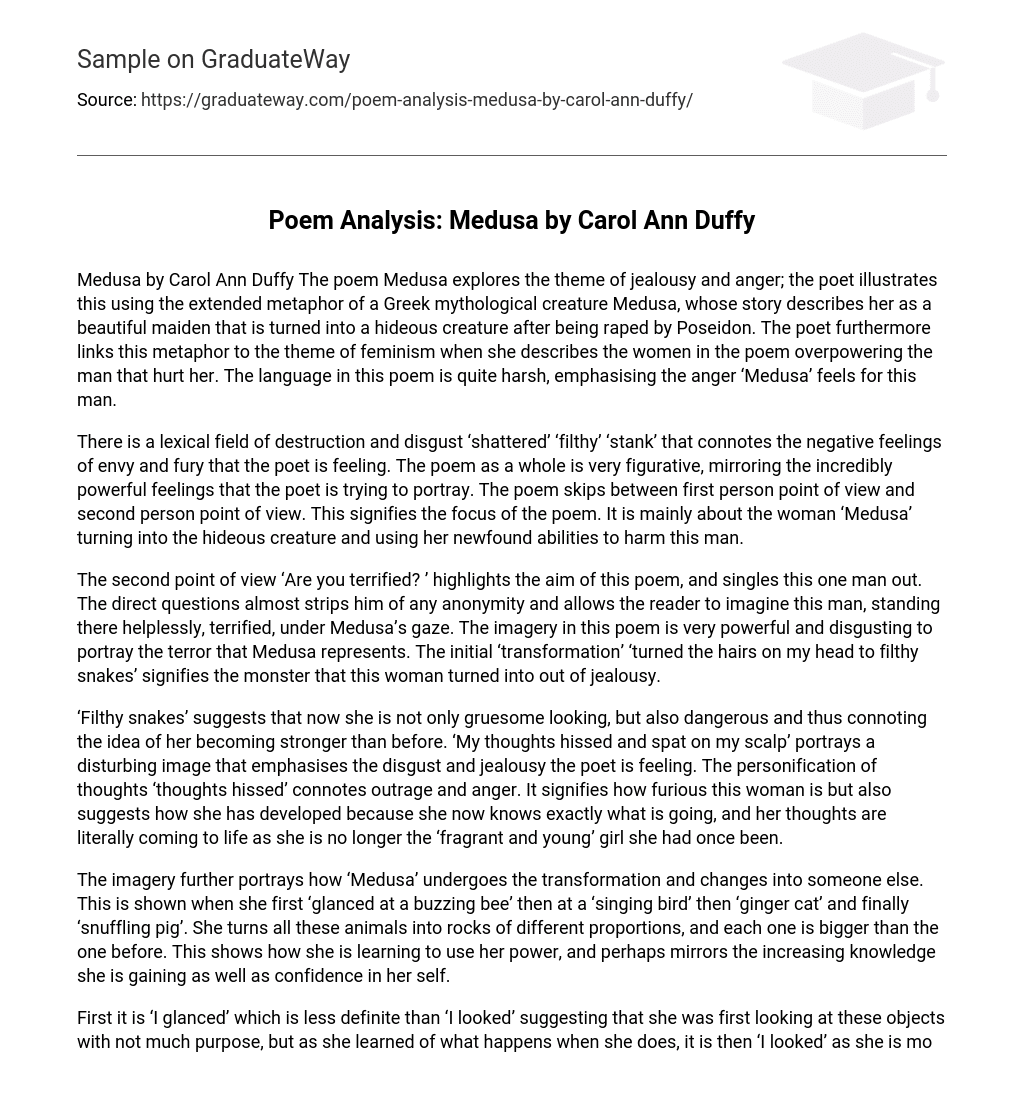Medusa by Carol Ann Duffy The poem Medusa explores the theme of jealousy and anger; the poet illustrates this using the extended metaphor of a Greek mythological creature Medusa, whose story describes her as a beautiful maiden that is turned into a hideous creature after being raped by Poseidon. The poet furthermore links this metaphor to the theme of feminism when she describes the women in the poem overpowering the man that hurt her. The language in this poem is quite harsh, emphasising the anger ‘Medusa’ feels for this man.
There is a lexical field of destruction and disgust ‘shattered’ ‘filthy’ ‘stank’ that connotes the negative feelings of envy and fury that the poet is feeling. The poem as a whole is very figurative, mirroring the incredibly powerful feelings that the poet is trying to portray. The poem skips between first person point of view and second person point of view. This signifies the focus of the poem. It is mainly about the woman ‘Medusa’ turning into the hideous creature and using her newfound abilities to harm this man.
The second point of view ‘Are you terrified? ’ highlights the aim of this poem, and singles this one man out. The direct questions almost strips him of any anonymity and allows the reader to imagine this man, standing there helplessly, terrified, under Medusa’s gaze. The imagery in this poem is very powerful and disgusting to portray the terror that Medusa represents. The initial ‘transformation’ ‘turned the hairs on my head to filthy snakes’ signifies the monster that this woman turned into out of jealousy.
‘Filthy snakes’ suggests that now she is not only gruesome looking, but also dangerous and thus connoting the idea of her becoming stronger than before. ‘My thoughts hissed and spat on my scalp’ portrays a disturbing image that emphasises the disgust and jealousy the poet is feeling. The personification of thoughts ‘thoughts hissed’ connotes outrage and anger. It signifies how furious this woman is but also suggests how she has developed because she now knows exactly what is going, and her thoughts are literally coming to life as she is no longer the ‘fragrant and young’ girl she had once been.
The imagery further portrays how ‘Medusa’ undergoes the transformation and changes into someone else. This is shown when she first ‘glanced at a buzzing bee’ then at a ‘singing bird’ then ‘ginger cat’ and finally ‘snuffling pig’. She turns all these animals into rocks of different proportions, and each one is bigger than the one before. This shows how she is learning to use her power, and perhaps mirrors the increasing knowledge she is gaining as well as confidence in her self.
First it is ‘I glanced’ which is less definite than ‘I looked’ suggesting that she was first looking at these objects with not much purpose, but as she learned of what happens when she does, it is then ‘I looked’ as she is more sure of what she can do and more determined to do so. Her power is tragic however. The bee was ‘buzzing’, the bird was ‘singing’ and the pig was ‘snuffling’ before she turned them all into rocks. She is literally taking the life away, but because the poet put these active verbs before the animals, it highlights how deathly Medusa’s look is.
The whole poem is free verse, which signifies the freedom the poet now feels. She has transformed into a stronger creature, that is more threatening and free than the woman she was before has been. She has progressed; she looked in the mirror, and saw a ‘dragon’, this shows how she herself feels that she changed; she has become more powerful. The structure of the poem links to the theme of the poem by the use of punctuation, sentence structure and rhetorical questions. The sentence length varies, and the longer sentences have more punctuation.
Therefore the pace is frequently interrupted and this portrays the feeling of ruination and decomposition which links to the idea of Medusa turning the animals into rocks and therefore interrupting the flow of life. The use of rhetorical questions is very effective in this poem, because it questions the reader and highlights the themes in the poem. The question ‘Are you terrified? ’ is showing this woman becoming more dangerous and more powerful, thus leaving the man helpless.
The fact that the next line simply states ‘Be terrified’ shows that she doesn’t care about an answer, she knows he should be, thus in commanding tone she tells him so. This brings in the theme of feminism, and how this woman is overpowering the man in this poem. In the poem Medusa, the poet mainly describes the transformation this woman goes through and the gain in power she experiences. She learns to use this newfound ability and becomes stronger, thus being able to dominate the man that caused her to feel such jealousy and unhappiness. The ending is especially powerful, both structurally and in content.
It’s a straightforward, bold and simple thus delivering that final blow to the reader. ‘Look at me now. ’ is in a sense a command to die, because it is known that if Medusa looks you in the eye, you turn into stone. Therefore the woman here is declaring her superiority by daring the man to face her and die. The Greek mythological elements ‘perfect man, Greek God, my own’ serve to emphasise the theme of femininity that runs through the poem. Medusa is probably the most famous and feared woman in Greek mythology, and thus a perfect representation of female domination.





